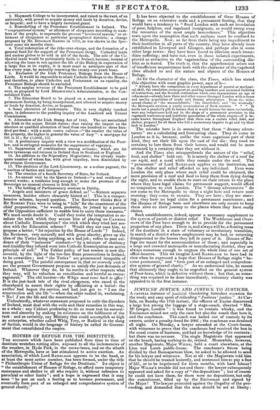HOUSES OF REFUGE FOR THE DESTITUTE.
THE accounts which have been published from time to time of destitute wretches rotting alive, exposed to all the inclemencies of the weather, in Hyde Park, in the mews-lanes, and on the wharfs of the Metropolis, have at last stimulated to active exertion. An association, of which Lord RANELAGII appears to be the head, or at least the most active member, has been formed, under the title "Philanthropic Union of Refuge for the Destitute." Its object is "the establishment of Houses of Refuge, to afford mere temporary sustenance and shelter to all who require it, without reference to parochial or other limits"; and a hope is expressed that it may soon "be put on such a footing as to become permanent, and eventually form part of an enlarged and comprehensive system of general charity." It has been objected to the establishment of these Houses of Refuge on an extensive scale and a permanent footing, that they would have a tendency to "flood London with such an inundation of poor, helpless, and vagabond immigrants, as would sweep away the resources of the most ample benevolence." This objection rests upon the assumption that such asylums must be confined to the Metropolis. Now, so far from there being any impediment to their institution in all parts of the country, they have already been established in Liverpool and Glasgow, and perhaps also in some other large towns : they have been found to alleviate much imme- diate suffering ; and have not, even in these isolated experiments, proved so attractive to the vagabondism of the surrounding dis- trict as is feared. The truth is, that the apprehension arises out of insufficient acquaintance both with the character of the vagabond class alluded to and the nature and objects of the Houses of Refuge.
As for the character of the class, the Times, which has stated this objection with most graphic power, says of it- " Already have the competition in every department of mental or mechani- cal skill, the emulation consequent on growing numbers and increased facilities of instruction, and the feverish restlessness which ever characterizes an age of refinement—already have these and other causes thronged London with a dense and motley population of needy and dreamy adventurers. From the wide- spread classes of the uncomfortable," the dissatisfied,' and the unsteady,' the Metropolis receives a yearly accumulation of fresh recruits. • • • It needs not a prophet's gift to foresee that it would become far more melancholy, were any inducement held out in the shape of a permanent provision to the vagabond restlessness and indefinite speculation of the whole empire—if it be- came known throughout England that there was a certain relief, fo6d, and shelter, prepared for all those who felt a momentary impulse to go and try their luck in London."
The mistake here is in assuming that these "dreamy adven- turers" are a calculating and forecasting class. They do come to London as it is, because, unlike the more sagacious part of their kind, they set their life upon the cast of the die : they need no certainty to lure them from their homes, and would not be more attracted by a certainty than they are without it.
And the Times also misapprehends the nature of the "relief, food, and shelter" held out. It is merely the shelter of a roof for one night, and a meal while they remain under the roof. The " permanent " of Lord RANELAGH applies to the institution, not to the shelter and relief afforded to any individual. Even were London the only place where such relief could be obtained, the mere provision of a roof and food to keep them from dying during the night, and to enable them to start on their return to the place where they have legal claims for permanent support, would afford no temptation to visit London. The " dreamy adventurers" do not come to the Metropolis to sleep a night here and return next morning : they come to remain. They are here ; they are starv- ing; they have no legal claim for a permanent sustenance ; and the Houses of Refuge here and elsewhere are only meant to keep them alive on their journey to the places where they have really claims.
Such establishments, indeed, appear a necessary supplement to the system of parish or district relief. The Workhouse and Over- seers of the Poor have enough to do to provide for the permanent pauperism of any place. There is, and always will be, a floating mass of the destitute in a state of voluntary or involuntary transition, in search of a district where employment may be had, or returning disappointed to the homes they left in quest of it. Houses of Re- fuge are meant for the accommodation of these ; and especially in a large and crowded metropolis or manufacturing district, they are always numerous enough to engross the whole time of one set of office-bearers. This we imagine Lord RANELAGH to have had in view when he expressed a hope that Houses of Refuge might "be- come permanent," and "form part of an enlarged and comprehen- sive system of general charity." As we understand him, he meant that ultimately they ought to be engrafted on the general system of Poor-laws, which is defective without them ; but that, as some- thing was required to be done immediately, voluntary charity was appealed to in the first instance.






















 Previous page
Previous page